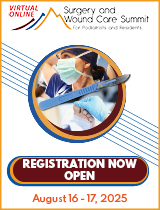RE: International Podiatry (Dave Williams, DPM)
From: Paul Kesselman, DPM
Don’t think for one moment that foreign MD’s
have a much rosier road than podiatrists who
wish to practice in a foreign country. My years
of experience with many foreign medical school
graduates and two MD colleagues who head their
respective departments in pediatrics and
psychiatry at major US institutions have
provided me with the following insights:
Allopathic medicine does not treat foreign MD’s
in a uniform or fair manner. In fact, the
foreign medical school applicant may not even be
eligible to sit for the US Medical Licensing
Examination. Without a US Medical license, the
foreign medical degree is just another piece of
paper with little to no value.
There is a formal examination process
administered by the Educational Commission for
Foreign Medical Graduates (ECFMG). If the
applicant did not attend a medical school listed
by ECFMG, then they are not qualified to sit for
the examination. This is irrespective of one’s
training and years of experience. Once an
applicant is certified by ECFMG (see
www.ecfmg.org), they can take the third part of
the US Medical licensing examination. If that is
passed they can apply for a US graduate medical
education program (residency).
This may sound more formal and uniform than
podiatric medicine; however the above is only
the first part in an attempt to have their
medical degree recognized. While these men and
women are far more mature, often willing to work
harder and more appreciative than their US
counterparts, they often face bias not
experienced by US medical school graduates.
Most hospitals and graduate medical residency
programs are reluctant to fill their slots with
foreign medical school graduates because most
hospitals depend on Medicare supplements for
residency programs (not yet available for
podiatry) for financial survival. As a result,
foreign medical school graduates often do not
get the best choices of hospitals or specialized
training programs. Most foreign medical school
graduates therefore are left with the “left-
overs.” These are slots not filled by US
graduates in inner city hospitals and in
specialties not often favored by US graduates.
Many foreign ECFMG graduates are often forced to
choose new specialties, which may be unrelated
to their previous specialties. I’ve encountered
anesthesiologists, surgeons and former
department heads with years of teaching
experience being forced into PGY1 slots in
family medicine.
Why do they do it? First many foreign graduates
have told me they are paid more in their US
residencies than as full-time practitioners in
their respective countries. Second because they
know once they have completed this arduous
process, they will be able to practice medicine
in a way they could never have dreamed of before
(this of course includes the reimbursement
nightmare we all face).
It is only once they have completed their
residency programs that they may be able to be
seen as equivalent to their US medical school
graduates and apply for specialty certification
(although many have told me they face bias for
their entire careers).
Arguably, the language barrier is often
something podiatrists will face abroad as do
foreign medical school graduates here in the US.
This is no easy task and something which often
takes years to overcome.
At least one can argue the US has a uniform (no
matter how unfair) system. Not so for podiatry.
How foreign countries treat the DPM degree is
really no different than the current system
which allows each US state to define the scope
of practice for podiatry. I too agree with the
writer until we have a uniform scope of practice
for all fifty states, foreign governments will
have a difficult time deciphering what a
podiatrists role is and what our scope of
practice may/may not be.
Perhaps if there was a uniform licensing
examination and scope of practice in all fifty
states, foreign countries would have a better
way to gauge our education and training. But
would that guarantee DPM’s abroad would not then
subject us to the same prejudices foreign
medical graduates face here in the US? I think
not. Certainly podiatrists should have as tough
a road abroad as the foreign medical school
graduate has here in the US. Anyone who thinks
not is not truly being fair!
From: Paul Kesselman, DPM, Woodside, NY,
pkesselman@pol.net







